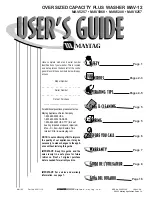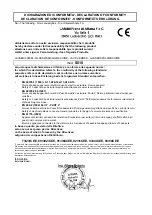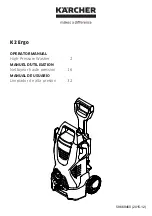
13
EN
RULES FOR SEPARATING LAUNDRY
•
Fabric type / indications on label (cotton, mixed fibres, synthetic,
wool, handwash items)
•
Colour (separate coloured garments from whites, wash new
coloured items separately)
•
Size (wash items of different sizes in the same load to improve
washing efficacy and weight distribution in the drum)
•
Delicates (place small items – such as nylon stockings – and
garments with clasps – such as braziers – in a laundry bag or in a
pillow case with a zip).
EMPTY POCKETS
•
Objects such as coins or safety pins can damage laundry and the
washer dryer drum.
WASH SYMBOLS
ON GARMENT LABELS
The value given in the tub symbol is the maximum temperature
possible for washing the garment.
Normal mechanical action
Reduced mechanical action
Much reduced mechanical action
Hand wash only
Do not wash
CLEAN THE WATER FILTER REGULARLY
•
This is needed to prevent the filter from blocking and preventing
the water from draining correctly. See the section
“Cleaning and
Maintenance” / “Cleaning the water filter”
in the detailed guide
that may be requested or downloaded from the website.
WWW
SAVING ENERGY AND PROTECTING THE
ENVIRONMENT
•
Keeping within the load limits indicated in the programme chart
will optimise energy, water and detergent consumption and
reduce washing times.
•
Do not exceed the detergent quantities recommended by the
detergent manufacturer.
•
Save energy by using a 60°C instead of a 90°C wash programme,
or by using a 40°C instead of a 60°C wash programme. We
recommend using the “ Baumwolle
” 60 °C programme for
cotton garments, which is longer but uses less energy.
•
To save energy and time when washing and drying, select
highest spin speed available for the programme to reduce the
residual water remaining in the garments at the end of the wash
cycle.
HINTS AND TIPS


































